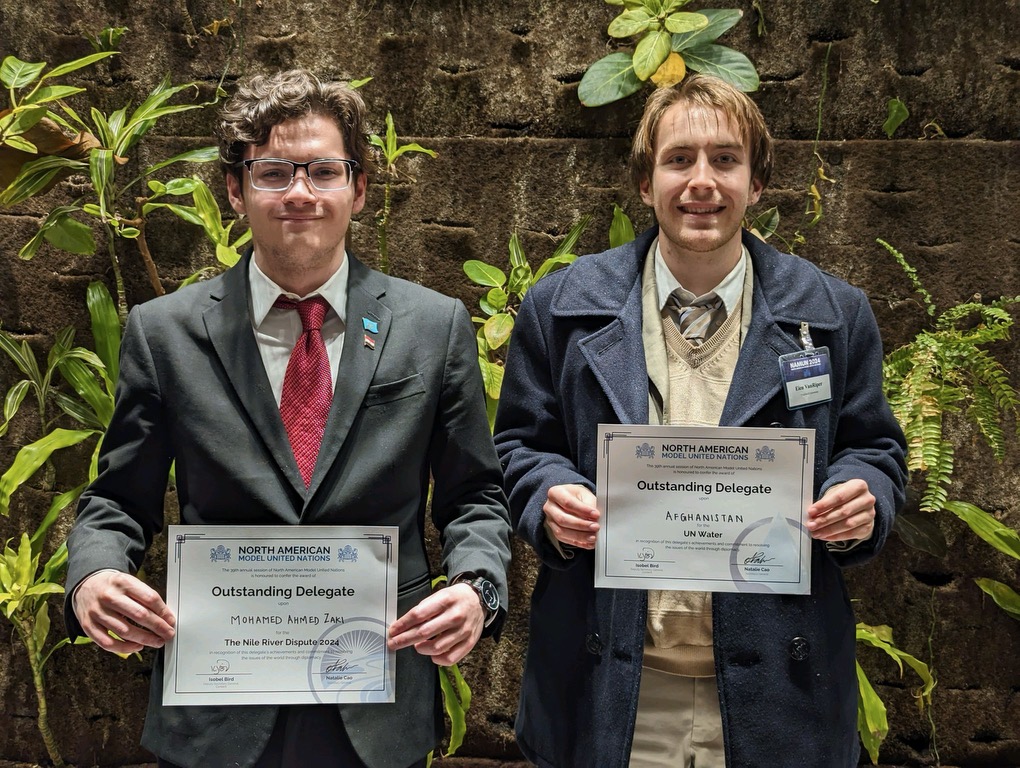Over spring break, Oakland University’s Model United Nations (UN) team traveled to Toronto for the North American Model United Nations (NAMUN) conference. Eien VanRiper and Landon Julius, two OU Model UN students, were named Outstanding Delegates, the highest award at the competition. Joshua Kobus was also named an honorable mention for the award.
NAMUN 2024 was the year’s first trip for OU’s Model United Nations team. After leaving the 2023 conference without receiving a single award, the team sought to change the narrative with this year’s competition.
According to Landon Julius, president of OU’s Model United Nations team, last year’s result was really out of character for the group.
The team succeeded in performing better in this year’s competition. Eien VanRiper was named “Outstanding Delegate” for the UN-Water Committee and Landon Julius was named “Outstanding Delegate” for the Nile River Crisis Committee.
NAMUN recognized Joshua Kobus as an honorable mention, something rather noteworthy considering the circumstances surrounding his participation. According to Julius, Kobus was thrust into a topic that he was unprepared for, having planned rigorously on a different topic for what he thought to be his committee. Despite this, Kobus was acknowledged for his work and argument.
“He [Kobus] didn’t get a physical award, but very high recognition from the conference as well,” Julius said. “His experience was particularly unique. He was initially thought to be on a completely different committee, so he did research and prep for everything. Comes to find out he’s in a different room, different topic, different everything. He transitioned from that and was still able to be recognized.”
In his respective committee, VanRiper represented Afghanistan. In Model UN competitions, there is a distinctive challenge: letting go of your own biases. As VanRiper says, you must show up and argue for a cause tailored to a specific nation, even if it does not align with your beliefs.
“I was playing Afghanistan, and you have to argue from the perspective of Afghanistan, right?,” VanRiper said. “Oftentimes, that means arguing from a perspective that doesn’t fit your personal beliefs. That’s an important part of the research, looking at that difference in perspective.”
VanRiper’s committee was given the task of discussing the topic of access to proper sanitation for drinking water and preserving natural ecosystems. For several reasons, Afghanistan suffers from a lack of access to clean drinking water.
“From Afghanistan’s perspective, it’s a country that has a lot of issues with accessing clean water,” VanRiper said. “It’s been contaminated by conflict and is also heavily impacted by climate change.”
The Model United Nations team will host their next event this April. Instead of participating in a Model UN competition, the team will host a conference for high school students.
“We’re all preparing for [hosting Model UN]. and doing things from the other side,” VanRiper said. “It’s a lot more work into it than you would probably think. We have to chair the committees and make sure everything is running smoothly. Instead of doing all this research into a country, you’re making rules.”
The high school conference will take place in Varner Hall on April 5 and 6.




